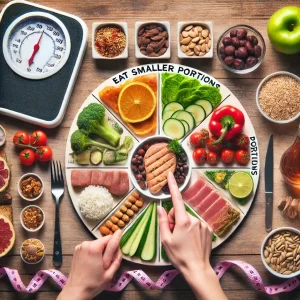The Alkaline Diet for Weight Loss: A Beginner’s Guide to pH-Balancing Foods
Introduction to the Alkaline Diet
The Alkaline Diet is based on the idea that certain foods can affect the body’s pH balance, promoting better health and weight loss by reducing acidity and encouraging a more alkaline environment. Advocates of the diet believe that the modern diet, which is heavy in processed foods,  sugar, and meats, causes the body to become too acidic, leading to weight gain, inflammation, and other health issues.
sugar, and meats, causes the body to become too acidic, leading to weight gain, inflammation, and other health issues.
The Alkaline Diet aims to restore balance by emphasizing the consumption of alkaline-forming foods, such as fruits, vegetables, nuts, and seeds, while limiting acidic foods like meats, dairy, and processed grains. By following this diet, proponents claim that you can not only lose weight but also improve your overall health and reduce the risk of chronic diseases.
This guide will explore how the Alkaline Diet works, its key benefits, potential drawbacks, and provide tips on how to follow the Alkaline diet for weight loss effectively.
How the Alkaline Diet Works for Weight Loss
The core idea behind the Alkaline Diet is that different foods affect the body’s pH level, with some foods promoting acidity and others promoting alkalinity. The diet encourages the consumption of alkaline-forming foods while minimizing acid-forming foods to maintain a more balanced pH level in the body.
While the body tightly regulates its pH levels (especially in the blood), the Alkaline Diet emphasizes the idea that reducing the intake of acidic foods and increasing the intake of alkaline foods can improve metabolic processes and promote weight loss.
Emphasis on Plant-Based, Low-Calorie Foods
Most of the foods recommended on the Alkaline Diet—such as fruits, vegetables, and legumes—are naturally low in calories but high in fiber and essential nutrients. These plant-based foods support healthy digestion, keep you feeling full longer, and help control your appetite. By replacing calorie-dense, acidic foods like processed meats and sugary snacks with alkaline-forming foods, you can create a calorie deficit that leads to weight loss.
Increased Hydration and Detoxification
Alkaline foods, particularly fresh fruits and vegetables, have high water content, which helps hydrate the body and flush out toxins. Staying well-hydrated supports the body’s natural detoxification processes, which can improve digestion, support metabolism, and aid in weight loss. The Alkaline Diet also encourages drinking alkaline water, which some believe further supports the body’s pH balance and promotes fat loss.
Reduced Inflammation
Acid-forming foods, such as processed meats, refined sugars, and dairy products, are believed to contribute to inflammation in the body. Chronic inflammation has been linked to weight gain, insulin resistance, and metabolic disorders. By focusing on anti-inflammatory alkaline foods, such as leafy greens, citrus fruits, and nuts, the Alkaline Diet may help reduce inflammation  and support weight loss efforts.
and support weight loss efforts.
Balanced pH for Improved Metabolism
Although the body’s internal pH remains tightly controlled, proponents of the Alkaline Diet believe that a more alkaline environment can support better metabolic function. By optimizing digestion and reducing the body’s reliance on acidic foods, the diet is said to help the body metabolize nutrients more efficiently, leading to improved energy levels and fat loss.
Key Components of the Alkaline Diet
The Alkaline Diet focuses on balancing the pH of your diet by consuming more alkaline-forming foods and fewer acid-forming foods. Here are the key components:
- Alkaline-Forming Foods: Fruits (e.g., lemons, watermelon, and bananas), vegetables (e.g., spinach, kale, broccoli, and cucumber), nuts (e.g., almonds and walnuts), seeds, and legumes.
- Acid-Forming Foods to Avoid: Processed meats, dairy products, refined grains, sugary snacks, sodas, and alcohol.
- Hydration: Drinking plenty of water, especially alkaline water, is encouraged to help maintain proper hydration and support the body’s natural detoxification processes.
- Portion Control: While the Alkaline Diet emphasizes healthy, natural foods, portion control is still important for managing calorie intake and achieving weight loss goals.
Benefits of the Alkaline Diet for Weight Loss and Health
The Alkaline Diet offers several benefits for weight loss and overall health. Here’s how it can help:
1. Low in Calories, High in Nutrients
Alkaline-forming foods are typically low in calories but rich in essential nutrients like vitamins, minerals, and antioxidants. By focusing on these nutrient-dense foods, you can reduce your overall calorie intake while providing your body with the nutrients it needs to function optimally. This calorie reduction can naturally lead to weight loss over time.
2. Supports Hydration and Detoxification
The high water content in alkaline-forming foods helps keep you hydrated, which is  essential for maintaining energy levels, supporting metabolism, and aiding in digestion. Proper hydration also helps the body flush out toxins, which can promote better health and support weight loss.
essential for maintaining energy levels, supporting metabolism, and aiding in digestion. Proper hydration also helps the body flush out toxins, which can promote better health and support weight loss.
3. Reduces Inflammation
Many of the alkaline-forming foods, such as leafy greens, citrus fruits, and nuts, are rich in anti-inflammatory compounds. By reducing inflammation in the body, the Alkaline Diet may help improve metabolic health, reduce the risk of chronic diseases, and make it easier to lose weight.
4. Encourages a Plant-Based Diet
The Alkaline Diet encourages a shift towards a more plant-based way of eating. Plant-based diets have been shown to support weight loss, improve heart health, and reduce the risk of diabetes. This focus on fruits, vegetables, and plant-based proteins can make it easier to maintain a calorie deficit and promote long-term weight loss.
5. May Improve Bone Health
Some proponents of the Alkaline Diet believe that consuming too many acid-forming foods can leach calcium from bones, leading to bone loss over time. By focusing on alkaline-forming foods, which are often rich in calcium and magnesium, the diet may support better bone health and reduce the risk of osteoporosis.
Potential Drawbacks of the Alkaline Diet
While the Alkaline Diet offers many potential benefits, there are also some challenges and limitations to consider:
1. Lack of Scientific Evidence on pH Balance
While the Alkaline Diet promotes the idea that foods can alter the body’s pH balance, scientific evidence on this claim is limited. The body regulates its internal pH levels very tightly, and the food you eat has little effect on the pH of your blood. However, the diet’s focus on healthy, plant-based foods can still support weight loss and overall health, even if the pH-balancing aspect is not scientifically proven.
2. May Be Restrictive
The Alkaline Diet limits the consumption of many popular foods, including meats, dairy, refined grains, and processed snacks. This can make it difficult to follow for individuals who are accustomed to eating a wider variety of foods. The diet may also be challenging in social settings or when dining out.
3. Potential Nutrient Deficiencies
By restricting acid-forming foods, such as meat and dairy, you may miss out on certain nutrients, such as protein, calcium, and vitamin B12. To avoid deficiencies, it’s important to plan your meals carefully and consider supplements if necessary.
Tips for Success on the Alkaline Diet
To get the most out of the Alkaline Diet and achieve your weight loss goals, follow these practical tips:
1. Focus on Alkaline-Forming Foods
Make the majority of your meals consist of alkaline-forming foods, such as fruits, vegetables, and nuts. These foods are naturally low in calories and rich in nutrients, which can help you create a calorie deficit while improving your overall health.
2. Stay Hydrated with Alkaline Water
Drink plenty of water throughout the day to stay hydrated and support your body’s natural detoxification processes. Some people choose to drink alkaline water to enhance the pH-balancing effects of the diet, but staying well-hydrated with regular water is also beneficial for weight loss.
3. Limit Acid-Forming Foods
While you don’t have to eliminate acidic foods entirely, try to limit your intake of meats, dairy products, refined grains, and processed snacks. These foods are typically higher in calories and can contribute to weight gain if eaten in excess.
4. Plan Your Meals
Planning your meals ahead of time can help you stick to the Alkaline Diet and avoid the temptation of processed, acid-forming foods. Prepare your fruits, vegetables, and plant-based proteins in advance to make it easier to create balanced, alkaline meals throughout the week.
5. Be Consistent
Consistency is key when following the Alkaline Diet. While it may take time to adjust to the new eating pattern, sticking with the diet and focusing on healthy, alkaline-forming foods will help you see results over time. Be patient, and trust the process.
Scientific Evidence and Case Studies
Although the scientific evidence supporting the pH-balancing claims of the Alkaline Diet is limited, many studies support the benefits of a plant-based diet for weight loss and overall health. Research has shown that diets rich in fruits, vegetables, and whole grains can promote weight loss, reduce inflammation, and improve metabolic health. For example, a study published in Nutrition Journal found that individuals who followed a plant-based diet experienced significant weight loss and improvements in cardiovascular health.
Additionally, reducing the intake of processed, acid-forming foods has been shown to improve gut health, reduce inflammation, and lower the risk of chronic diseases, all of which can support long-term weight loss and well-being.
Who Should Try the Alkaline Diet?
The Alkaline Diet is a good option for individuals who:
- Want to focus on a plant-based, whole-foods approach to weight loss.
- Are looking to reduce inflammation and improve overall health.
- Prefer to avoid highly processed foods, refined sugars, and unhealthy fats.
- Are interested in exploring how different foods affect their body’s digestion and energy levels.
Who Should Avoid the Alkaline Diet?
The Alkaline Diet may not be suitable for individuals who:
- Have specific dietary needs that require higher levels of protein or animal-based nutrients.
- Prefer a more flexible eating plan with a wider variety of food options.
- Find it challenging to avoid meat, dairy, or processed foods in social or family settings.
Conclusion
The Alkaline Diet promotes weight loss by emphasizing plant-based, alkaline-forming foods that support digestion, reduce inflammation, and improve overall health. While the scientific evidence supporting its pH-balancing claims may be limited, the diet’s focus on nutrient-dense, low-calorie foods can still be an effective approach to losing weight and maintaining a healthy lifestyle. By following the tips and guidelines in this guide, you can succeed on the Alkaline Diet and achieve your weight loss goals in a balanced, sustainable way.